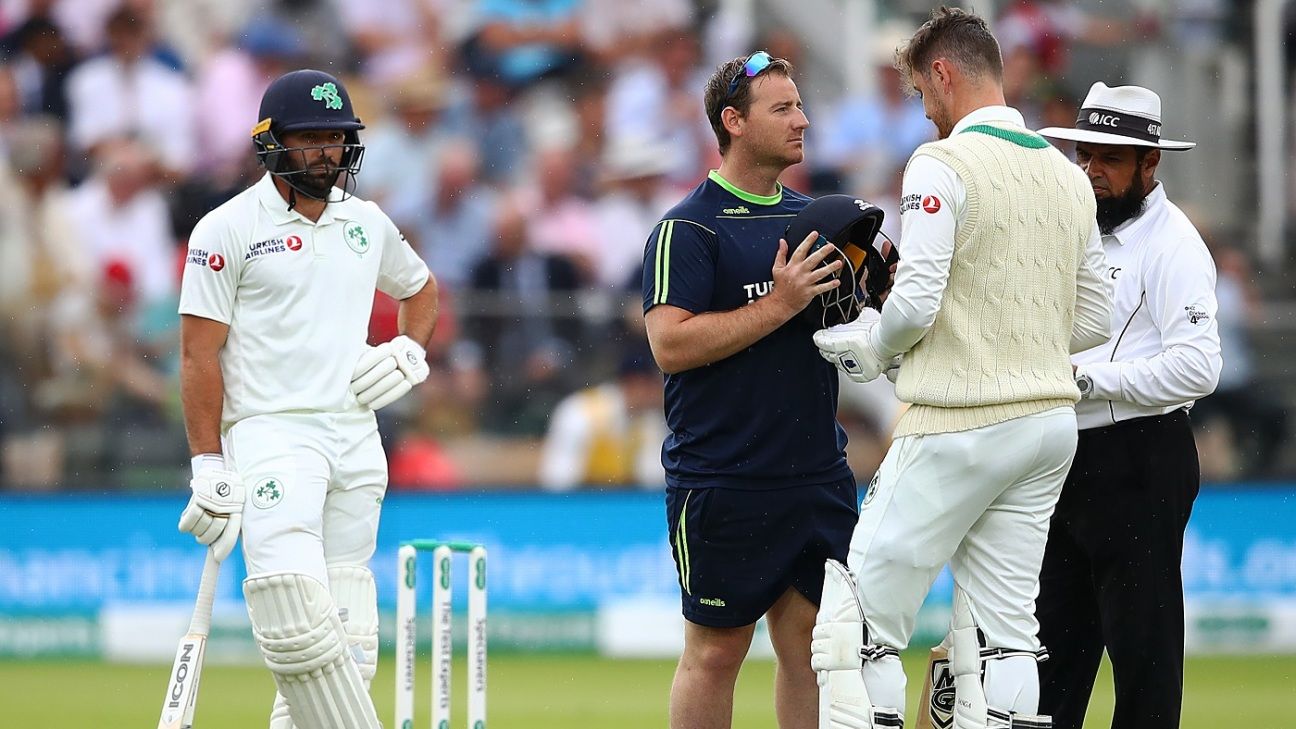
Match referees will take the final call on concussion substitutes under new ICC regulations, giving them the power to rule out a replacement player entirely if the referee deems there is no appropriate "like for like" player available.
The concussion substitute rule will make its start in Test cricket in the first Ashes match between England and Australia at Edgbaston from Thursday, also the opening contest of the inaugural World Test Championship, in which the world's top nine teams will compete over six bilateral series each to play in a final in England in two years' time.
The ICC's most senior referee, Ranjan Madugalle, will be the primary arbiter of the new concussion rule, in concert with the umpires Aleem Dar, Joel Wilson, Chris Gaffaney and the England and Australia team doctors, Mark Wotherspoon and Richard Saw. Geoff Allardice, the ICC's operations manager, explained that the match referee will be empowered to decide whether a concussion replacement is appropriate in the circumstances, whether they should be restricted in what they can do in the game, and if a replacement should be ruled out.
"The treatment of the player is the No. 1 priority with this," Allardice said. "Whether the player is to take no further part in the game comes from the medical staff, and whether there is a replacement available is the secondary consideration. If a player breaks a leg in a game there's no replacement available with that circumstance either. It is an opportunity for teams to help manage their players better, but there'll be a bit of a period where we'll find out the rules and if there are any loopholes with the rules that have been set.
"In terms of the like for like replacement ... the match referee is the sole decision maker on that. Every circumstance is going to be different depending on when the player is requested to be replaced. If a bowler is injured and they've only got a batting innings left then the decision might be different than if the same player was injured and they've only got a bowling innings left. It's very much around the circumstances of the game.
"The match referee could put conditions on a player being involved. If there is an all-rounder replacing a batter, then he might put a condition that that player is unable to bowl during the match. The referee has the flexibility to best accommodate a like for like replacement. There will be a period where we're going to find if there are any loopholes with the rules."
Plenty of questions about the concussion substitute provision have been raised by the Australian captain Tim Paine, among others, many around the scenario whereby Nathan Lyon has been chosen as the sole frontline spin bowler in the touring squad. Should Lyon be ruled out of a match while batting, the closest spin replacement Australia may have is Marnus Labuschagne, who would be batting a long way below his usual station at Lyon's usual No. 10.
"The referees will be given guidelines as will the teams around how to interpret those, but it's very much around what is the likely role of the injured player for the rest of the match, and who is most like for like with the role that player would play," Allardice said. "The aim of the concussion replacements is to try and make the decision making around payers who've sustained injuries and concussions a bit more straightforward.
"If there's any pressure for those players to continue in the game because the team doesn't want them to be one player short, then there is a replacement player available. The conditions around concussion replacements are the player needs to be concussed, it needs to happen on the field of play during play, it needs to be replaced with a like for like player, which will be up to the discretion of the match referee, and a request for a replacement needs to come within 36 hours of the incident happening."
Another area still being discussed is how to handle matches and series in which a fully accredited team doctor is not present for each team. There is the possibility that in future, the ICC may add an independent doctor to its current travelling officials team of three umpires and the match referee.















 Phone: (800) 737. 6040
Phone: (800) 737. 6040 Fax: (800) 825 5558
Fax: (800) 825 5558 Website:
Website:  Email:
Email: 






